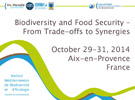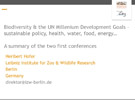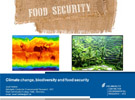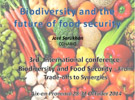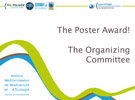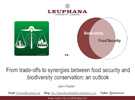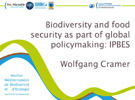
|
|
|
Programme > Plenary SessionsOct 29, 14:00: Arrival, registration, setting-up posters Oct 29, 16:00: Opening SessionWelcome to Aix-en-Provence(Wolfgang Cramer, IMBE) Download presentation Welcome by CNRS-InEE(Robert Chenorkian, InEEDeputy Director) Welcome by the Leibniz-Association (KlementTockner, Coordinator Biodiversity, WGL) Biodiversity, the Millennium Development Goals, Health, Water and Biodiversity (Heribert Hofer, IZW, Berlin) Download presentation Climate, biodiversity and food security(Josef Settele, UFZ, Halle) Download presentation Keynote presentation "Biodiversity and Food Security" by José Sarukhán, UNAM, Mexico Human populations have depended since their presence on this Planet on plants and animals for its sustenance and wellbeing. However most of the scientific global efforts to know, catalogue and conserve biodiversity in the last two or three decades and specially after the establishment of the CBD has focused on what may be termed the “wild biodiversity”. The attention and systematic study placed on the components of biodiversity of which mankind depends to feed itself, take care of its health and other less tangible but important needs, have been scarce and very spotty at best, even from the agricultural, livestock and fisheries points of view. Confronted with the unpredictable effects of global change on the reliability of these sources of sustenance, it seems growingly imperative to know and understand in a more integral way the potentials and limitations of the human managed biodiversity and the form in which we produce them now and specially for the future generations. Download presentation Oct 29, 19:00: Welcome aperitif offered by Aix-en-Provence city hall in its buildings. Oct 30, 9:00: Session 1 - Environmental changes and food security: consequences and opportunitiesCoordinators: Sandrine Paillard (ANR, Paris) / Alexandra Lux (ISOE/BiK-F, Frankfurt) The right to food is a fundamental human right. But, although some progress has been made during the last years, one in eight people go to bed hungry, says the recent MDG Report. With focus on food systems that rely on natural resources, the session aims at exploring the current findings on ensuring food security in the face of climate change, land degradation, globalisation and other drivers of environmental changes. Which strategies are developed by households and societies in order to cope with the changing conditions for food production? Decisions on individual level may encompass diet changes, sale of belongings and strengthening local networks or (temporary) migration. Policy strategies may range from support programmes for agriculture and fishery and capacity building to international cooperation. We would like to concentrate on promising approaches that allow combining efforts in food security and human well-being with the sustainable use of biodiversity. Keynote presentations by
Oct 30, 10:30: Coffee and refreshments Oct 30, 11:00: Session 2 - Green economy, food security, and biodiversityCoordinators: Klement Tockner (IGB, Berlin) / Jean-Michel Salles (LAMETA, Montpellier) The boom in green economy and the need to feed up to 9 billion people in the near future will stimulate the rapid development of new agricultural technologies and practices. Urban farming, multifunctional natural and technical systems, as well as increasing use of genetically modified and synthetic organisms will fundamentally transform terrestrial and aquatic landscapes. This will require a radical re-thinking of ecosystem management for maintaining biodiversity and ecosystem services; and it will pose a major challenge on the underpinning science too. Keynote presentations by
Oct 30, 12:30: Lunch and posters Oct 30, 14:00: Session 3 - Sustainable use of biodiversityCoordinators: Deborah Goffner (CNRS, Dakar) / Ulrich Stachow (ZALF, Müncheberg) One of today’s major land management challenges is to build resilient landscapes that are capable of providing both food security and sustainable livelihoods while minimizing negative impacts on the environment. Landscapes are comprised of mosaics of individual components, each providing a unique, yet often overlapping set of ecosystem services to respond to environmental and human needs. Progress in land use techniques enables choices for land use schemes to fulfil these needs. However, when biophysical land characteristics are not factored into the land management equation, this could ultimately result in ecologically undesirable effects. The question therefore arises: Why should land be made available for a certain use at all costs despite the fact that the environmental conditions make this unadvisable? Instead of decoupling land uses from its natural environment, site-specific, resource-preserving land use ought to be the rule. For a reliable indication of such complex systems with different scales, a social-ecological systems approach is indispensable. Hence, the integration of biodiversity within intensively used landscapes is a step in this direction. As a means to address the growing needs for agricultural production and environmental conservation, session 4 will focus on integrated, land management concepts and systems that address the nexus of agriculture, conservation and other competing land uses. From a social science perspective, the role of local communities, indigenous knowledge, and governance in building sustainable landscapes needs to be addressed. Finally, analyses of “lessons learned” from previous and ongoing integrated land management programs are also an important part of the equation for future win-win solutions. Keynote presentations by
Oct 30, 15:30: Coffee and refreshments Oct 30, 16:00: Session 4 - Conceptual pitfalls in the food-biodiversity nexusCoordinators: Joern Fischer (Leuphana University, Lüneburg) / Muriel Tichit (INRA, Paris) Both policy makers and scholars are increasingly interested in the nexus of food and biodiversity. However, despite a rapid increase of interest in this area, there is substantial controversy about the conceptual basis that should underpin analyses and policies on food and biodiversity. The premise of this session is that it is vital to get this conceptual basis right to avoid unwanted or perverse outcomes (e.g. confusion in understanding scientific findings and their policy implications). In an effort to improve the conceptual basis of future analyses, in this session we draw attention to potential conceptual pitfalls of an ecological, socio-economic, and integrated nature. In addition to drawing attention to important pitfalls, we hope to stimulate discussion on how to improve research and governance on food and biodiversity in the future. The issues to be discussed include (i) the mutual dependence of food production and biodiversity conservation; (ii) the relationship between bundles of ecosystem services and biodiversity; (iii) the strengths and limitations of a land sparing/sharing framework; (iv) the conceptual foundation of “sustainable intensification”; and (v) the challenges of implementing policy in a context of multi-level governance. Keynote presentations by
Oct 31, 9:00: Four parallel synergy workshopsOct 31, 12:30: Lunch and posters Oct 31, 14:00: Session 5 - Science-based opportunities to reconcile food security, biodiversity conservation and sustainable developmentCoordinators: Heribert Hofer (IZW, Berlin) / Wolfgang Cramer (CNRS, Aix-en-Provence) This session includes cross-sectoral presentations as well as conclusions from the morning workshops Keynote presentations by
Oct 31, 15:30: Closing SessionReport back from Workshops (chair: Heribert Hofer) Poster award Download presentation
Towards synergies between food security and biodiversity conservation: an outlook (Joern Fischer) Download presentation Biodiversity and food security as part of global policymaking: IPBES (Wolfgang Cramer) Download presentation Closing statements Oct 31, 17:30: End of conference, departure |
